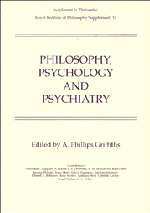Book contents
- Frontmatter
- Contents
- Preface
- Introduction: Just Getting Started
- Mind and Madness: New Directions in the Philosophy of Psychiatry
- Emotion and Memory: The Second Cognitive Revolution
- Meaning and Mechanism in Psychotherapy and General Psychiatry
- Making Sense on the Boundaries: On Moving Between Philosophy and Psychotherapy
- Mental Disorder, Illness and Biological Disfunction
- Integrity, Boundary and the Ecology of Personal Processes
- Multiple Personality and Computational Models
- Psychology and Politics: Lies, Damned Lies and Self-Deception
- Personal Identity and Psychiatric Illness
- Vices and the Self
- Wild Beasts and Idle Humours: Legal Insanity and the Finding of Fault
- Dangerousness and Mental Disorder
- Problems with the Doctrine of Consent
- Homosexuality
- Nietzsche and Music
- References
- Notes on Contributors
Psychology and Politics: Lies, Damned Lies and Self-Deception
Published online by Cambridge University Press: 03 May 2011
- Frontmatter
- Contents
- Preface
- Introduction: Just Getting Started
- Mind and Madness: New Directions in the Philosophy of Psychiatry
- Emotion and Memory: The Second Cognitive Revolution
- Meaning and Mechanism in Psychotherapy and General Psychiatry
- Making Sense on the Boundaries: On Moving Between Philosophy and Psychotherapy
- Mental Disorder, Illness and Biological Disfunction
- Integrity, Boundary and the Ecology of Personal Processes
- Multiple Personality and Computational Models
- Psychology and Politics: Lies, Damned Lies and Self-Deception
- Personal Identity and Psychiatric Illness
- Vices and the Self
- Wild Beasts and Idle Humours: Legal Insanity and the Finding of Fault
- Dangerousness and Mental Disorder
- Problems with the Doctrine of Consent
- Homosexuality
- Nietzsche and Music
- References
- Notes on Contributors
Summary
Can deception be a model for self-deception? There are familiar problems with saying that it can be. At the heart of all these problems, in the long run and despite the complexities and sophistications of the various theories, is this one evident point: all deception of another requires at least two choosing and believing agents, and such a duality is not—is it?—a model which we can tolerate for understanding a single person. Yet on the other hand we seem to have no other way of describing self-deception; most attempts to do so, even if they begin by criticising the ‘deception’ model, prove, in the long run, to come down to it.
Preamble: introductory remarks
I want to explore one example of the interlocking of deception and self-deception: where deception leads to and brings about self-deception. (An actual example, since I find these far more useful in issues to do with mind and psychology than thought-experimental ones.) That is: the role of state propaganda to induce—in a sufficiently-large section of a population—a condition that can best be described as self-deception. There is much material for such an argument just now. Archives in Moscow and St Petersburg have recently been opened-up, revealing a great deal more about the efforts of the Soviet state to ensure the obedience and allegiance of the majority of the population; just now, too, we have been living through several years of extreme and extraordinary propaganda to persuade citizens to fight against their neighbours in former Yugoslavia.
- Type
- Chapter
- Information
- Philosophy, Psychology and Psychiatry , pp. 115 - 130Publisher: Cambridge University PressPrint publication year: 1995



